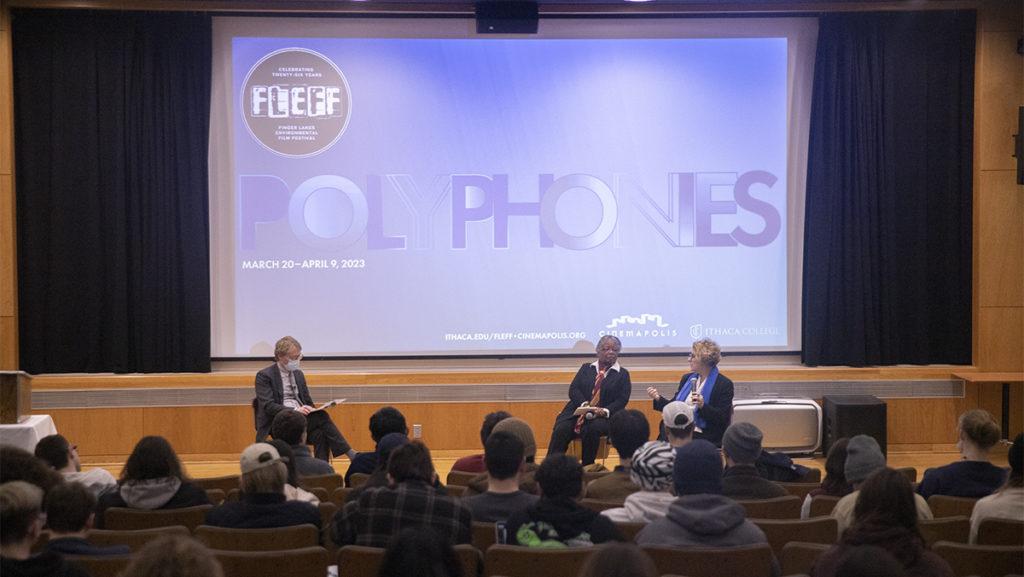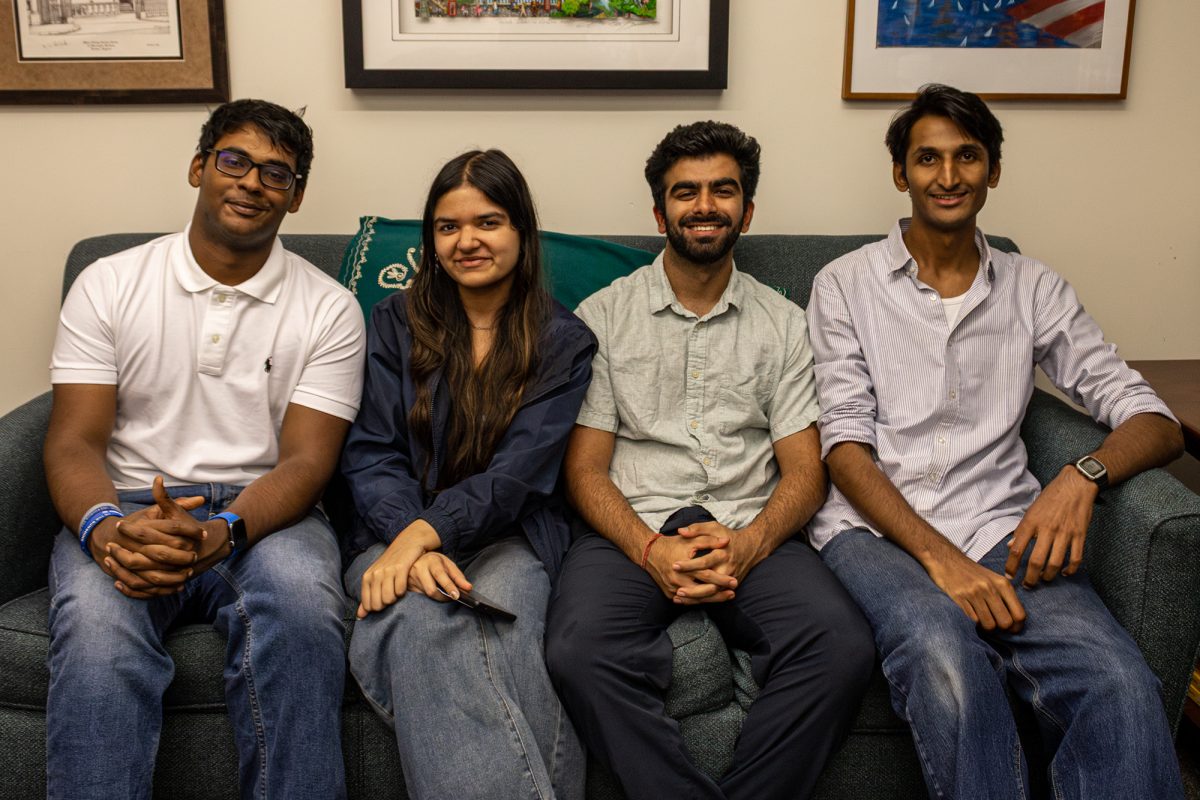The Finger Lakes Environmental Film Festival (FLEFF) is the second oldest environmental and human rights film festival in the United States. During its 25 years as an Ithaca staple, it has captivated, entertained and enlightened international audiences through a variety of multimedia events and conversations.
Now entering its 26th year, the festival had its humble beginnings at Cornell University while also partnering and collaborating with Ithaca College. Although the college has always been one of the major supporting sponsors of FLEFF and events for the festival were held at the college when it began, the college did not run it. This year, FLEFF officially finds its new home at the college’s Roy H. Park School of Communications. To celebrate this development, the Park School announced it will be hosting five pre-festival events for the first time in conjunction with Cinematic Currents: FLEFF and the History of Film Festivals, a new Park course for FLEFF interns, in a series it is branding “Festivals in Focus.”
Not only will these pre-festival events, which are open to the public, serve as the kickoff for this year’s FLEFF film festival, it will also mark the beginning of a new public-facing initiative developed by Amy Falkner, dean of the Park School. As part of the pre-festival events, the Park Communications Forum aims to address current and unfolding developments affecting the field of communications nationally and internationally through the promotion of critical analysis and public dialogues.
A Deep Dive Into FLEFF, the first of these events, took place Feb. 1 in the form of a roundtable conversation between Patricia Zimmermann, Charles A. Dana Professor of Screen Studies in the Department of Media Arts, Sciences and Studies and Director of FLEFF, and Tanya Saunders, retired assistant provost in the Department of International Programs and Extended Studies, and Executive Producer Emerita of FLEFF.
The roundtable, which celebrated FLEFF’s history as an interdisciplinary, multi-arts festival was moderated by Andrew Utterson, associate professor in the Department of Media Arts, Sciences and Studies. Utterson, who has been involved with FLEFF for more than 10 years, originated the idea of the events for Festivals in Focus with the goal of enhancing the festival experience itself by bringing in professors and experts to discuss the state of the film industry. Through the five conversations, he said he wants his students and the public to gain new perspectives and understandings, collectively enriching the festival experience before it begins March 20.
This year, FLEFF will run from March 20 through April 9. The festival will feature over 65 events, including displaying films, new media, concerts, book launches, showings of silent films with live music, talks, roundtables, forums and more. While most of the events will be taking place at the college, select showings of films will be hosted by FLEFF partner and local independent cinema Cinemapolis in Downtown Ithaca.
“The hope is really to begin the party early in terms of unique pleasures and opportunities, in terms of bringing people together to discuss the environment and the various lived environments we all inhabit,” Utterson said.
Other roundtable discussions in the series that have already occurred include Public Health and Media Campaigns on Feb. 8 and Resets of Festivals and Theatrical Runs on Feb. 15. Events still to come are Streaming and Media Disruptions on Feb. 22 and Shifting Terrain: Producing Live Events on March 1.
The idea behind the events reflects this year’s festival theme, “Polyphonies,” with regard to how they each aim to incorporate multiple voices and perspectives. Polyphony, itself, means combining various individual elements to create something harmonic. This is something Zimmermann said she takes pride in and hopes to reflect through the festival’s interdisciplinary structure.
“FLEFF has a mission and a mandate to be interdisciplinary and that is from the time it started,” Zimmermann said. “When it moved to Ithaca College, that was more than a mandate. It was a direct institutional goal and, of course, it’s a goal that I completely agree with intellectually.”
Organizers of the festival have encouraged the participation and inclusion of all five of the college’s academic schools since it first began through the various forms of events that are offered, long before it made its home at the Park School. Zimmermann has used the pre-festival events to further this goal by including deans and faculty from each school in the events themselves. Events will open with an introduction by one of the deans as each event reflects an issue specifically related to each school.
Zimmermann said she brought this idea to Falkner, who said she was happy to comply in inviting the other deans to participate.
“It’s always a good sign when the schools want to work together,” Falkner said. “So that part of it is very exciting. All the deans, we’re very collaborative and want to help each other, so when I asked the four of them if they can come help us out, they were all immediately like, ‘Yes, absolutely.’”
Falkner kicked off the first of the five conversations by briefly discussing the important role social media plays in news distribution. At the event, she encouraged attendees to ask inquisitive questions to each speaker throughout the five events to further their knowledge about the world of media and how film festivals bring important ideas to the table for discussion, an idea that Brett Bossard ’95, executive director of Alumni and Family Engagement, said he personally identifies with.
Bossard served as the executive director of Cinemapolis for nine years before transitioning to his new role at his alma mater in September 2022. Bossard said that at the theater, he was more hands-on regarding the execution of the festival. In his previous role, he specialized in managing relationships with distributors and handling things around the venue. He now holds a more advisory role at the college, focusing largely on the campus experience while co-teaching the Cinematic Currents: FLEFF and the History of Film Festivals course with Utterson and Rachel Schaff, lecturer in the Department of Media Arts, Sciences and Studies.
Bossard’s decade of experience at Cinemapolis and his direct knowledge of film distribution and festivals informs his impressions of the present state of film festivals. Similar to how many of FLEFF’s 65-plus events will be a mix of in-person and virtual, so, too, will other festivals in the future. While he believes this is a necessary effort considering the state of the industry in the post-pandemic world, he maintains that the best way to experience film festivals is in person.
“There’s no replacing an in-person film screening and the kind of energy that comes from being in a communal environment, seeing a film for the first time and being able to, in that immediacy, really address the issues that a film brings up and talk about those issues in a local context with the people sitting right next to you,” Bossard said.
The future of film festivals and the role that streaming and virtual platforms like Zoom will continue to play as the industry returns to a state of an embodiment will be a major topic of discussion throughout the remaining pre-festival events.
“Every issue being discussed is turbulent,” Zimmermann said. “This is the biggest reset in the arts and entertainment industry since the coming of sound in 1927 and since the Paramount Decree in 1948 and since the massive conglomeration in the early ’60s and since the massive mergers in the late ’80s. This is a huge time of turbulence. Things are being reorganized.”
Learning more about these topics and the other academic institutions participating in the remaining pre-festival events are just two things that junior Guadalupe Fanelli is looking forward to in the coming weeks.
Fanelli, a Cinema Production and Screen Cultures major who also participated in the FLEFF mini-course offered by the Park School before it became a four-credit seminar this year, is happy to see a lot of the same themes carry over, but with new events and new opportunities.
“There’s a lot more to engage with and I think that’s intellectually exciting,” Fanelli said.
Freshman Madison Schriver said they are also eager to engage with the various opportunities that the festival will provide this year.
“For me, I’ve never attended any kind of film festival,” Schriver said. “So, just the fact to be watching all these different varieties of films and cinema and emerging media is what I’m most looking forward to in the class.”














